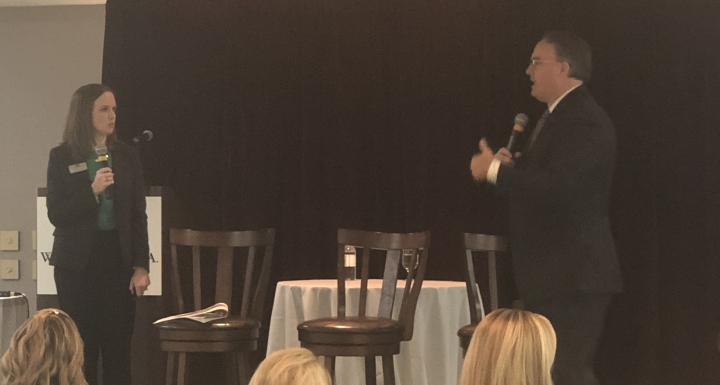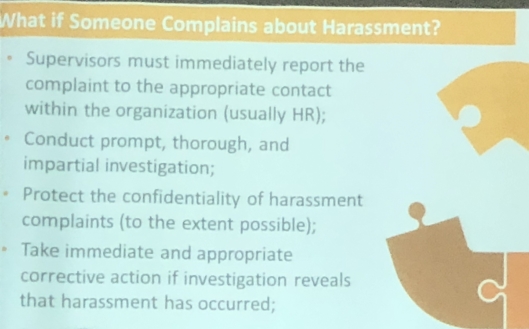This is the second in a series of articles summarizing key topics addressed at the Ward and Smith, P.A. 2018 Employment Law Symposium held in Wilmington, North Carolina.
Sexual harassment in the workplace has been in the news a lot lately, thanks to high-profile cases involving people such as former Fox News CEO Roger Ailes, actor Kevin Spacey, and Hollywood executive Harvey Weinstein.
Ward and Smith labor and employment attorneys Ken Gray and Emily Massey believe that because of those and other high-profile cases, as well as the #MeToo movement that's swept through social media, employers are likely to see an increase in harassment claims.

Speaking at Ward and Smith's 2018 Employment Law Symposium, Gray, who leads the firm's labor and employment practice, cited a 2016 study that found that three-quarters of individuals who had experienced sexual harassment never report it.
"We think that people now have more awareness of their rights and these percentages will go up," Gray added.
As an employer, Gray added, you need to do two main things to minimize the impact of harassment cases:
- First, you need to take measures to prevent harassment from happening. This includes training so all your employees understand what harassment is.
- Second, you should have robust policies and procedures for dealing with harassment claims.
Training is important, in part, because many people simply don't realize what behavior constitutes harassment. Employees need to understand that harassment extends beyond traditional situations.
Gray noted, for example, that in the past year he litigated sexual harassment cases in North Carolina with many different facts: cases involving allegations of a woman harassing a woman, a man harassing a man, and a woman harassing a man—in addition to cases involving allegations of men harassing women.
Figuring out what is or isn't harassment can be tricky also, he and Massey noted. Context, nuance, tone of voice, and other subtleties can make a difference. The universal characteristic of harassment is that it's unwelcome—whether it's an off-hand remark or physical contact. And sometimes it can be hard to tell whether particular behaviors, such as jokes or even compliments, are acceptable or not.
"You don't know what's in somebody else's head and whether or not you have struck a nerve that is offensive to them," Gray stated. "People might not know what is going on in somebody else's life."
Gray noted that even if an employee doesn't fit into a category that's otherwise legally protected, such as gender or race, that person could have family members or close friends who are in such a category, which means the conduct might be considered offensive even when it wasn't directed at the particular individual.
Gray described a hypothetical situation—a supervisor who is a 60-something man with grandchildren. He's also divorced, but has a boyfriend. People in his workplace might be completely unaware that he's a homosexual, but making jokes or derogatory comments about homosexual people in his presence could still constitute harassment.
 A rule of thumb for you and your employees: If an employee tells you that a certain type of comment or behavior is offensive, take them seriously. Allowing other employees or individuals to continue to make such comments or engage in such behaviors increases the likelihood of a harassment claim—it may not be at all relevant whether other employees or you think that taking offense is "unreasonable."
A rule of thumb for you and your employees: If an employee tells you that a certain type of comment or behavior is offensive, take them seriously. Allowing other employees or individuals to continue to make such comments or engage in such behaviors increases the likelihood of a harassment claim—it may not be at all relevant whether other employees or you think that taking offense is "unreasonable."
In addition to training employees to understand what harassment is and what behaviors might cross the line, even when they aren't meant to offend, you also need to have robust policies and procedures in place to eradicate the offending behavior.
Gray stated those policies should make it clear your company has an open-door policy, that it wants harassment claims to be reported internally and any claims will be taken seriously.
The policy should address different types of potential harassers as well. For instance, a harassment claim can arise not only because of the actions of a subordinate employee, but also because of the actions of one of your senior executives, board member, or even an outside vendor or customer.
"Bottom line," Massey said, "encourage an environment of mutual respect."
When you do have a harassment claim, Gray stated the best approach is to be proactive and handle it quickly. This includes consulting a lawyer for legal advice and then, if appropriate, terminating the offending actor or doling out other punishments quickly. And then you should also consider training—or re-training—all employees, to make sure it doesn’t happen again.
Robust policies, training, and proactive responses to harassment claims are much more likely to persuade the Equal Employment Opportunity Commission that you have taken proper action.
"You have to decide, 'Are we going to be an organization that allows people to do these things, particularly if they're important to our organization, or are we going to be a zero-tolerance organization?'" Gray said. "If you're going to be a zero-tolerance organization, and a claim is brought against your company, you have a good chance of prevailing, because you're doing the right thing."
-----------------------------------------------------------------------
More insights from Ward and Smith's 2018 Employment Law Symposium:
Dealing with Workplace Discrimination
Key 2018 Legal Updates for Employers
Real Life Lessons in Workplace Diversity








